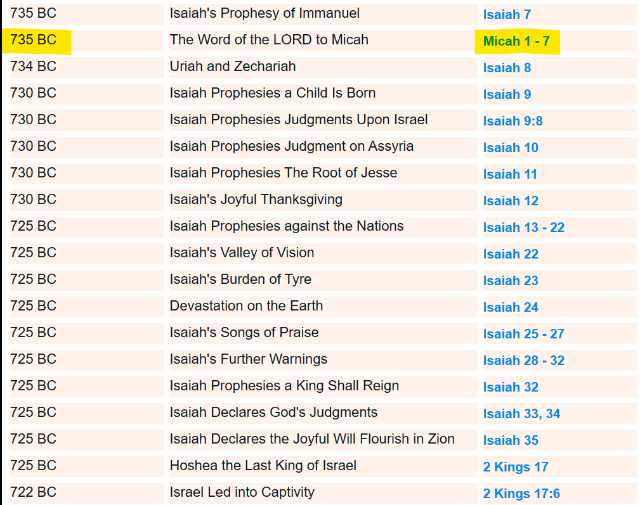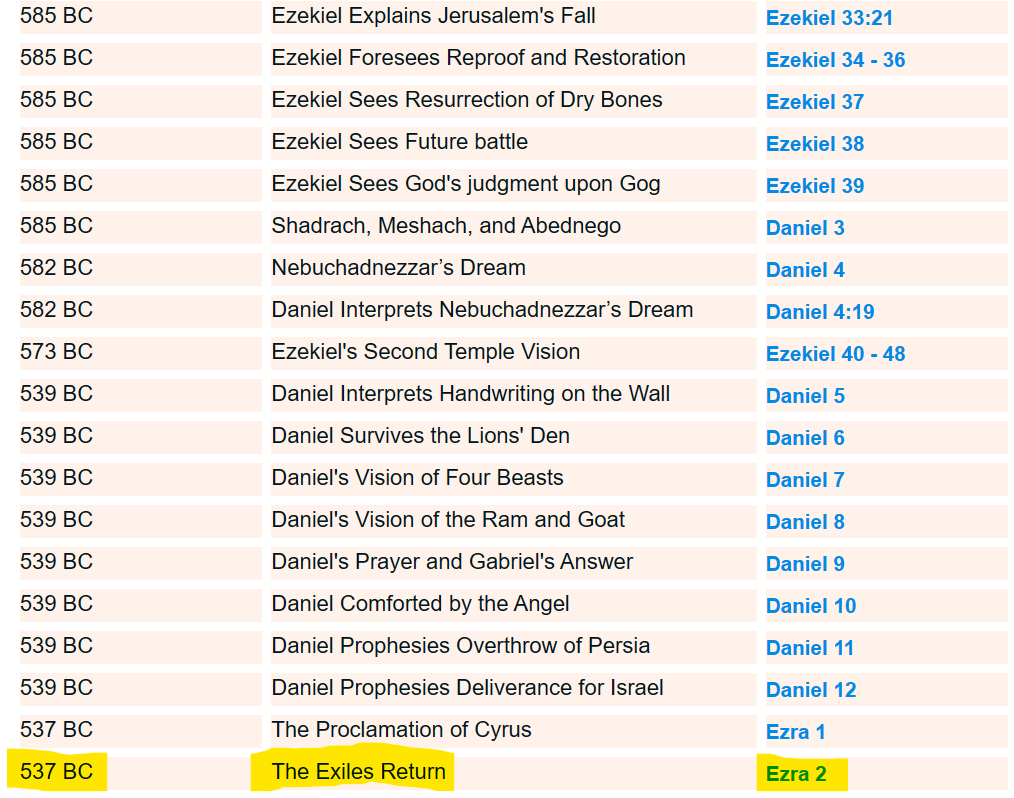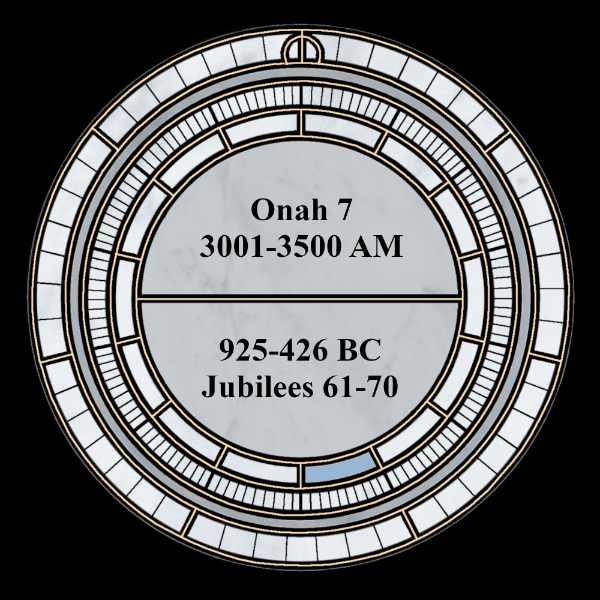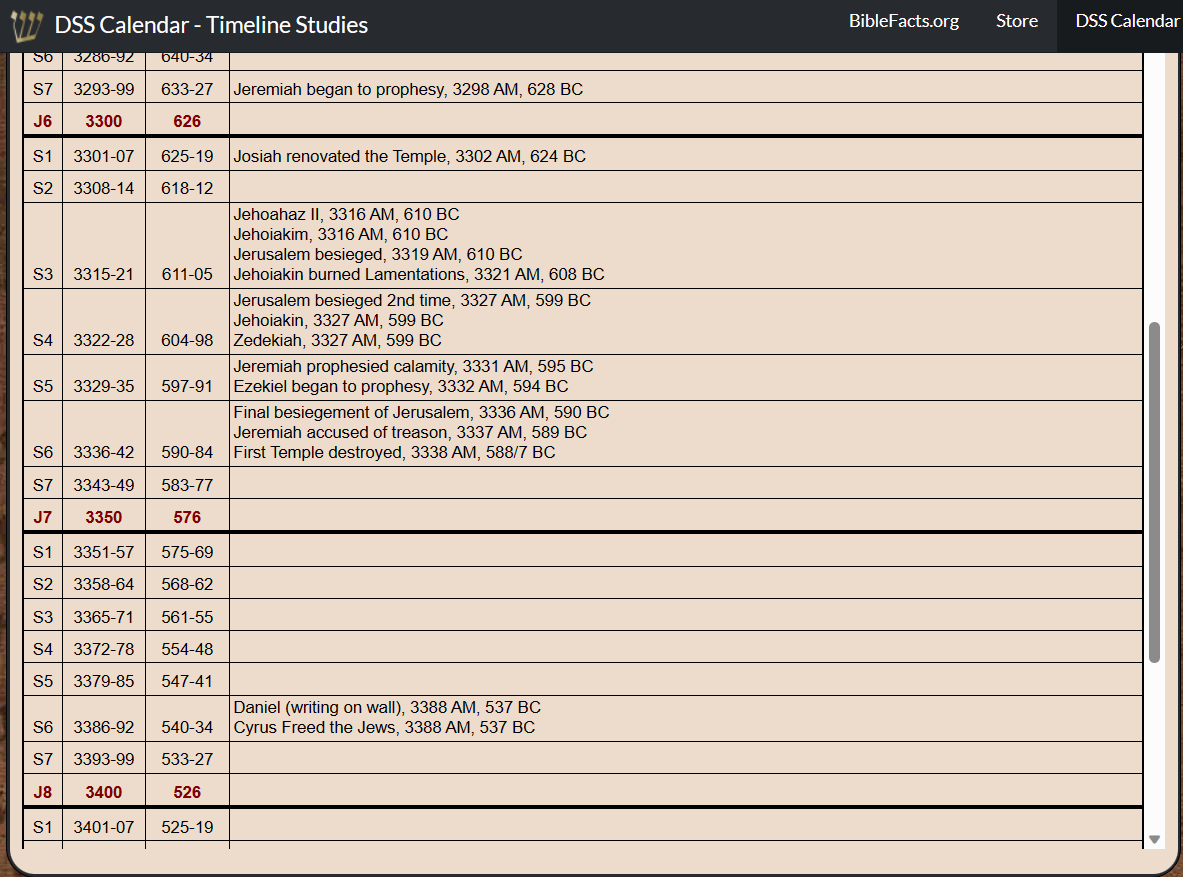Writing around 735-700 BC. Israel (northern kingdom) wracked with idols and Judah (southern kingdom) nearly as bad. Very soon, Israel will be taken away and spread throughout the nations of Genesis 10/11. Later, Judah will fall to the Babylonians, but remain basically in-tact in captivity. It is Israel that will be split up by the Assyrians.



From the time of Micah to the siege of Jerusalem and its fall will be about 150 years. There will be another 50 years of exile. Interesting that this is the length of a Jubilee cycle. The graphic below is a Jewish Zadok (DSS) calendar timeline, where we can see how the events line up calendrically.


1 It shall come to pass in the latter days(a)
that the mountain of the house of the LORD
shall be established as the highest of the mountains(b),
and it shall be lifted up above the hills;
and peoples(c) shall flow to it,
2 and many nations(d)shall come, and say:
“Come, let us go up to the mountain of the LORD,
to the house of the God of Jacob(e),
that he may teach us his ways(f)
and that we may walk in his paths.”
For out of Zion shall go forth the law(g),
and the word of the LORD from Jerusalem.
- "Latter days"? = Jesus until now? Yes—3rd age: Age of Grace, which is Onahs 9 through 12 that make up the third 2000-year Age, 4001-6000 AM or AD 75-2075 (with 50 year jubilee cycle starting in 2025).
- Theologically, not literally. Why?
- What peoples? The nations. See Genesis 10 "Table of Nations".
- Ibid.
- Deuteronomy 32:7-9 esp. v 9 "Jacob, his allotted heritage"
- וְיוֹרֵ֙נוּ֙ or wə·yō·w·rê·nū "and He will teach us"
- תוֹרָ֔ה or ṯō·w·rāh "Torah" law or "teaching of the word of Yahweh"
Verses 3-5: The return and Kingdom of God has happened. And while the nations presently (in Micah's time) are following their gods, a time is coming when the damage done by the fallen Watchers will be utterly undone. So much so that the Gentile peoples joined by Jesus through the Cross will stop learning war as they did from Azazel (fallen Watcher) back in Genesis 6 and 1 Enoch.
To a Jew at the time of Micah, from their point of view, the gods of the nations were still teaching war and weapons to their human underlings. The word of the LORD is bringing this into full view to communicate that there is coming a time when this will cease. Why? Because those gods are going to be locked up forever. As a result, Gentiles who formerly learned war and weapons from demons and Watchers will now use the same knowledge to reverse the transgression of the Watchers, bringing peace and safety under Jesus!
3 He shall judge between many peoples,(a)
and shall decide disputes for strong nations(a)far away;
and they shall beat their swords into plowshares,
and their spears into pruning hooks;
nation shall not lift up sword against nation,
neither shall they learn war anymore;(b)
4 but they shall sit every man under his vine and
under his fig tree,
and no one shall make them afraid,
for the mouth of the LORD of hosts(c)has spoken.
5 For all the peoples(a)walk
each in the name of its god,(d)
but we(e)will walk in the name of the LORD our God
forever and ever.
- Again—peoples, nations: See Genesis 10/11 Tower of Babel
- 1 Enoch 8:1 - "And Azâzêl taught men to make swords, and knives, and shields, and breastplates, and made known to them the metals (of the earth) and the art of working them." See NOTE 1 below.
- LORD of hosts—who are the hosts? Divine Council Worldview.
- Tower of Babel (Genesis 11)
- Who is "we"? Israel? Yes—but also rescued Gentiles.
NOTE 1: Nowhere in the OT does scripture speak of men learning war, warfare, and how to form weapons of war. The closest passage is Genesis 4:22 where Tubal-cain: "... he was the forger of all instruments of bronze and iron." Only in the Enochian backstory are we told that it is fallen sons of God (Watchers') who teach men such skills. Therefore, in contrast to popular belief of today, the body of knowledge making up the polemic story of Enoch most likely already exists in some primitive way (fragments, oral histories, et al). This is a full 400 years before 1 Enoch is assembled and redacted.
NOTE 2: Please refer to Dr. Amy E. Richter's dissertation on The Enochian Template vs the Gospel of Matthew, starting in Chapter 5, page 242, section: "The Watchers’ Violence Versus Jesus’ Peace" where she outlines Jesus' perfectly putting aside weapons. Even though He allows them to be present, He either never allows them to be used, or He immediately heals the wounds of those harmed and commands the weapons be put away. This is a strict reversal of the sins of the Watchers' and their transgressions. Micah 4 now provides us with a prophecy that is partially fulfilled by Jesus in the gospels, and will find ultimate fulfillment eschatologically in the future!
6 In that day,(a) declares the LORD,
I will assemble the lame
and gather those who have been driven away
and those whom I have afflicted;(b)
7 and the lame I will make the remnant,
and those who were cast off, a strong nation;(c)
and the LORD will reign(d)over them in Mount Zion
from this time forth and forevermore.(a)
- The "forevermore" of verse 7 tells us the timing or era.
- I suggest this is dispersed Israel, Judah, Jews, and Gentiles, together.
- Seems confirmed. God finally gets His nation.
- The former gods are gone, only Jesus is now reigning.
8 And you, O tower of the flock,(a)
hill of the daughter of Zion,
to you shall it come,
the former dominion shall come,(b)
kingship for the daughter of Jerusalem.(c)
- מִגְדַּל־ עֵ֗דֶר or miḡ·dal-‘ê·ḏer, Tower of the Flock—near Bethlehem and was a place where flocks were kept. There's a reference to Migdal Eder in the Old Testament, in Genesis 35:21, and it is said to be the place where Jacob moved his tent after the death of his wife Rachel. Some scholars also think that Migdal Eder is the place where the shepherds were told of Jesus’ birth, making it an important location in Christian tradition.
- The former dominion possibly referring in this context to a return of a worldwide establishment of Eden—the original dominion of God before the nachash (Watcher) attacked Eve, spreading sin to both herself and Adam.
- Everything centers on Jerusalem (the New coming down out of heaven). This is all eschatologically forward looking.
9 Now why do you cry aloud?
Is there no king in you?(a)
Has your counselor perished,(b)
that pain seized you like a woman in labor?
10 Writhe and groan, O daughter of Zion,
like a woman in labor,
for now you shall go out from the city
and dwell in the open country;(c)
you shall go to Babylon.(d)
There you shall be rescued;
there the LORD will redeem you
from the hand of your enemies.(e)
- A call to introspection—remember when they asked for a king? See 1 Samuel 8, where Israel asks for a king. What happens?
- They have rejected God's plan for a council led by Himself.
- "open country" = wilderness (demons, bad things)
- We're only about 150 years until the exile of Judah to Babylon, but we are really close to Israel being attacked by the Assyrians and scattered among the nations. Don't worry—God is going to use this scattering of Jews to all of the nations of Genesis 10 to prepare the way for the Gospel of Jesus Christ to come storming in to the Gates of Hell in each nation as a result of Pentecost yet to come!
- This is a double/triple entendre. Why? Not only will God rescue Judah from Babylon, but the wider cast of exile to the nations will set the stage for the reversal of the sins of the Watchers', the demise of the gods and demons, and set the stage for Jerusalem to be the beachhead from which God launches the assault of the Gospel of Jesus to retake the nations (Gentiles) back to Himself from those fallen angelic beings!
1 When Samuel became old, he made his sons judges over Israel. 2 The name of his firstborn son was Joel, and the name of his second, Abijah; they were judges in Beersheba. 3 Yet his sons did not walk in his ways but turned aside after gain. They took bribes and perverted justice.
4 Then all the elders of Israel gathered together and came to Samuel at Ramah 5 and said to him, “Behold, you are old and your sons do not walk in your ways. Now appoint for us a king to judge us like all the nations.” 6 But the thing displeased Samuel when they said, “Give us a king to judge us.” And Samuel prayed to the LORD. 7 And the LORD said to Samuel, “Obey the voice of the people in all that they say to you, for they have not rejected you, but they have rejected me from being king over them.
NOTE: This is a fantastic example of God's intended way: Him as King with a Council of Elders, where they interact with God, who makes final choices. But these guys don't like God's leadership. As God states clearly: "... they have rejected Me from being king ...". Now, link this back to Micah 4:9 and the Lord is reminding them of their choice. Their human kings have failed them, led them into idols, and the gods of the nations around them. The result of demanding a human king has led them to disobey the first commandment: "You shall not have the gods of the other nations on the ground that is Mine!" (Exodus 20:3)
11 Now many nations
are assembled against you,(a)
saying, “Let her be defiled,
and let our eyes gaze upon Zion.”
12 But they do not know
the thoughts of the LORD;
they do not understand his plan,(b)
that he has gathered them as sheaves to the threshing floor.(c)
13 Arise and thresh,
O daughter of Zion,(d)
for I will make your horn iron,(e)
and I will make your hoofs bronze;
you shall beat in pieces many peoples;(f)
and shall devote their gain to the LORD,
their wealth to the Lord of the whole earth.(g)
- The gods (fallen divine council sons of God) are ready to pounce. They think they can still stop Messiah either through death, disease, or corruption (i.e., Nephilim). They are frothing at the mouth for the conquest of the People of Yahweh!
- 1 Corinthians 2:8 reads: "None of the rulers of this age understood this, for if they had, they would not have crucified the Lord of glory."
- God is looking to destroy the gods, demons, and the wicked, but He is not looking at Gentiles with anger, but with Grace and Love, where His plan is to rescue them from those abusive gods and demons; every human life that He can reach through Jesus!
- This whole thing starts in Jerusalem. See Act 1 where Jesus commands them to stay in Jerusalem. Why? Because Jerusalem is that beachhead that Micah is talking about. It is from here that war to take back the nations begins. This is ground-zero for God's D-day!
- The iron horn is the Person of Jesus Christ operating from Jerusalem—now, but not yet.
- Threshing is the goal; separation of the wheat from the chaff, the righteous from the unrighteous. This is the backstory of 1 Enoch. See references below:
- The "gain" is the wheat. See the parable of the Sower below.
1 Enoch 1:9:
"And behold! He cometh with ten thousands of His holy ones
To execute judgement upon all,
And to destroy all the ungodly:
And to convict all flesh
Of all the works of their ungodliness which they have ungodly committed,
And of all the hard things which ungodly sinners have spoken against Him."
1 Enoch 5:7:
"But for the elect there shall be light and joy and peace,
And they shall inherit the earth"
That same day Jesus went out of the house and sat beside the sea. And great crowds gathered about him, so that he got into a boat and sat down. And the whole crowd stood on the beach. And he told them many things in parables, saying: 'A sower went out to sow. And as he sowed, some seeds fell along the path, and the birds came and devoured them. Other seeds fell on rocky ground, where they did not have much soil, and immediately they sprang up, since they had no depth of soil, but when the sun rose they were scorched. And since they had no root, they withered away. Other seeds fell among thorns, and the thorns grew up and choked them. Other seeds fell on good soil and produced grain, some a hundredfold, some sixty, some thirty. He who has ears, let him hear.'
Footnotes / References
Dr. Amy Richter, PhD Dissertation, Ch. 5
The Watchers’ Violence Versus Jesus’ Peace
The watchers bring violence into the world through illicit pedagogy and through the giants and the spirits of the giants, but Jesus prescribes an ethic of peace. Jesus’ followers will encounter violence, but they are not to be agents of violence. Unlike the watchers and their offspring who bring violence and destruction into the world, Jesus exhorts his followers to peace and nonviolence. This message is seen clearly in Jesus’ teaching in Matthew 5-7. For example, Jesus includes amongst the verses known as the Beatitudes, “Blessed are the peacemakers, for they will be called sons of God” (μακάριοι οἱ εἰρηνοποιοί, ὅτι αὐτοι ὑιοὶ θεοῦ κληθήσονται, Matt 5:9). Rather than seeking vengeance, Jesus advocates “turning the other cheek” to those who commit violence against his followers (in Matt 5:39), as well as love for enemies and prayer for those who persecute his followers (in Matt 5:44) in order to be “sons of your father in heaven” (Matt 5:49). Davies and Allison, however, express some difficulty squaring Jesus’ words in the beatitudes with Jesus’ statement, “Do not think that I have come to bring peace on the earth; I have not come to bring peace, but a sword” (Matt 10:34 NRSV). Hagner remarks that the disciples’ expectation must have been that Jesus came “to bring peace” because of how the statement is worded. Does Jesus in Matthew 10 advocate violence rather than peace?
Jesus’ statement in Matt 10:34-36 does not contradict his advocacy elsewhere of peace. Jesus does not prescribe violence. He describes the division that will result among family members because of his followers’ obedience to Jesus’ ethic. He predicts that his followers will suffer because of the choice to follow him. Those who do not follow will experience suffering, but after a future judgment and the punishment is not described as meted out by Jesus’ followers. This is in marked contrast with the participation of the righteous in 1 Enoch in vengeance on the wicked. For example, in 1 En. 91:12, in the Apocalypse of Weeks, Enoch’s revelation includes the detail that during the eighth week of righteousness, “a sword will be given to all the righteous, to execute righteous judgment on all the wicked, and they will be delivered into their hands.” In 1 En. 98:12, in the Epistle of Enoch, Enoch repeats the theme that the righteous will be involved in the punishment of those judged as wicked: “Now be it known to you that you will be delivered into the hands of the righteous, and they will cut off your necks, and they will kill you and not spare you.”
Jesus’ righteous followers will be rewarded after the eschatological judgment. However, their reward includes neither pleasure nor responsibility of exercising judgment on the unrighteous.
Jesus’ disciples are to be peacemakers who are willing to suffer, even to lose their lives for Jesus’ sake (Matt 10:29). As the disciples go out on their missionary journey, they are to let their peace be upon the houses which are worthy. To those that are not, the disciples are to “let your peace return to you” and “shake the dust from your feet” (Matt 10:13-14 NRSV). They are not instructed to punish or commit violence against those who reject them.
Towns which do not receive the disciples will be punished “on the day of judgment” (Matt 10:15). When one of those with Jesus at his arrest draws a sword and cuts off the ear of the slave of the high priest, Jesus tells him to put his sword away, saying, “all who take the sword will perish by the sword” (Matt 26:51-52 NRSV). Jesus says that he does not need the protection of the sword; he could at any time have the defense of angels if he chose (Matt 26:53). Unlike the watchers’ and giants’ violent and warlike destructiveness, Jesus preaches a message of peace.